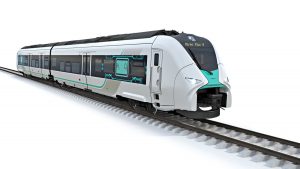 Deutsche Bahn and Siemens Mobility agreed to develop and test a new hydrogen regional train and to build a special fueling station at the DB Regio plant in Tübingen.
Deutsche Bahn and Siemens Mobility agreed to develop and test a new hydrogen regional train and to build a special fueling station at the DB Regio plant in Tübingen.
The two companies are committed to a climate-friendly transition in transport and are testing the use of hydrogen for rail for the first time, a new and complete system consisting of the train and its specially developed infrastructure which will replace diesel-powered trainsets operating on regional routes and further reduce CO2 emissions.
A one-year test of the train in the region around the city of Tübingen is planned. During its planned trial operation between Tübingen, Horb and Pforzheim in 2024, the train will replace a conventional diesel-powered unit running on the route. Approximately 120,000 kilometers of scheduled rail service are planned.
Under the project, Siemens Mobility will develop a prototype based on the Mireo Plus train. The two-car train set will be equipped with a newly developed hydrogen drive consisting a fuel cell and a lithium-ion battery.
The designated Mireo Plus H will be as powerful as its electric counterpart and have an operating range of up to 600 kilometers, depending on operating conditions such as the season or the route. A three-car version will have a range of 1000 kms. Low life-cycle costs due to low maintenance and repair costs and a top speed of 160 km/h are the vehicle’s distinguishing features. The train will have 1.7 MW of traction power providing up to 1.1 m/s² acceleration and a top speed of 160 km/h. “This innovative technology will make hydrogen-powered train operations faster, more efficient and more environmentally friendly,” Michael Peter, the CEO of Siemens Mobility said.
Deutsche Bahn is developing a new type of fueling station that can refuel the train at the same time as a diesel-powered train. The refueling station will refuel the train in 15 minutes. The hydrogen will be produced on site in Tübingen using traction electricity generated from renewable sources. DB will convert the workshop in Ulm to accommodate the maintenance of hydrogen powered trains.
The new hydrogen regional train will save around 330 tonnes of CO2 per year.
DB is currently operating around 1,300 diesel trains in regional service, and roughly 40 percent of DB’s 33,000-km rail network is not electrified. In addition to the option of further electrifying the system, the use of hydrogen-powered trains offers one possibility for DB becoming climate-neutral.
The state government of Baden-Württemberg is providing support for the project, and the Federal Ministry for Transport and Digital Infrastructure (BMVI) has announced its intention to fund the project.
“It’s great that the first train employing this new and sustainable technology will be tested here in Baden-Württemberg. Especially on non-electrified routes, hydrogen fuel cell propulsion can become a climate-friendly alternative to diesel propulsion,” Winfried Hermann, Minister of Transport of Baden-Württemberg said.
Officially, the joint funding project is called “H2goesRail”. The BMVI has announced funding through the National Innovation Programme Hydrogen and Fuel Cell Technology (NIP 2) which is coordinated by the National Organisation Hydrogen and Fuel Cell Technology (NOW) GmbH and implemented by the Project Management Organisation Jülich.
Share on:



